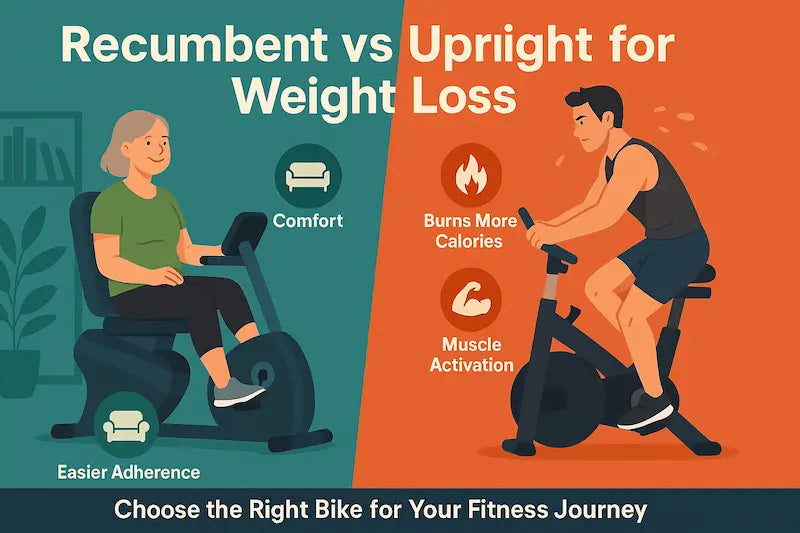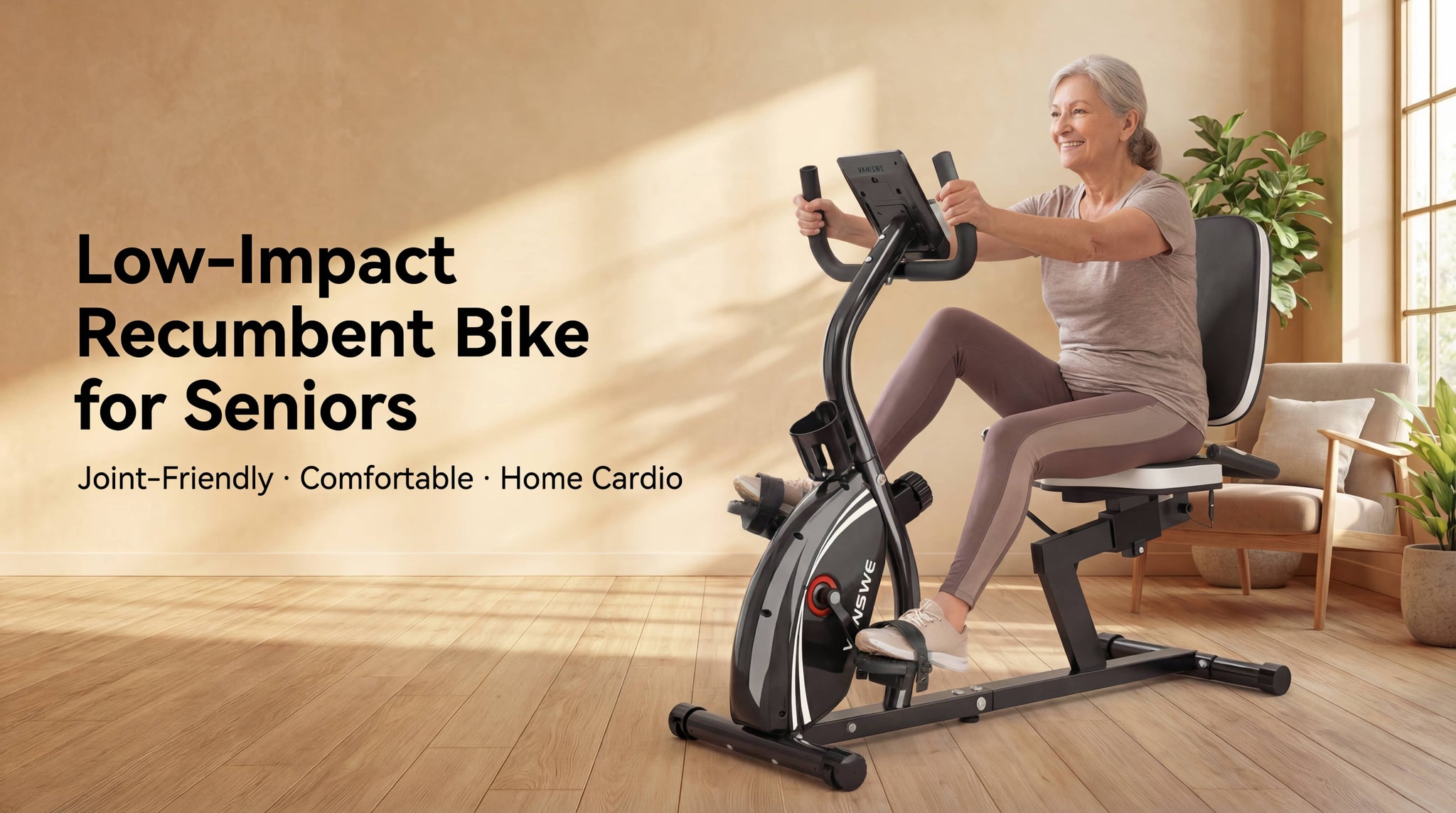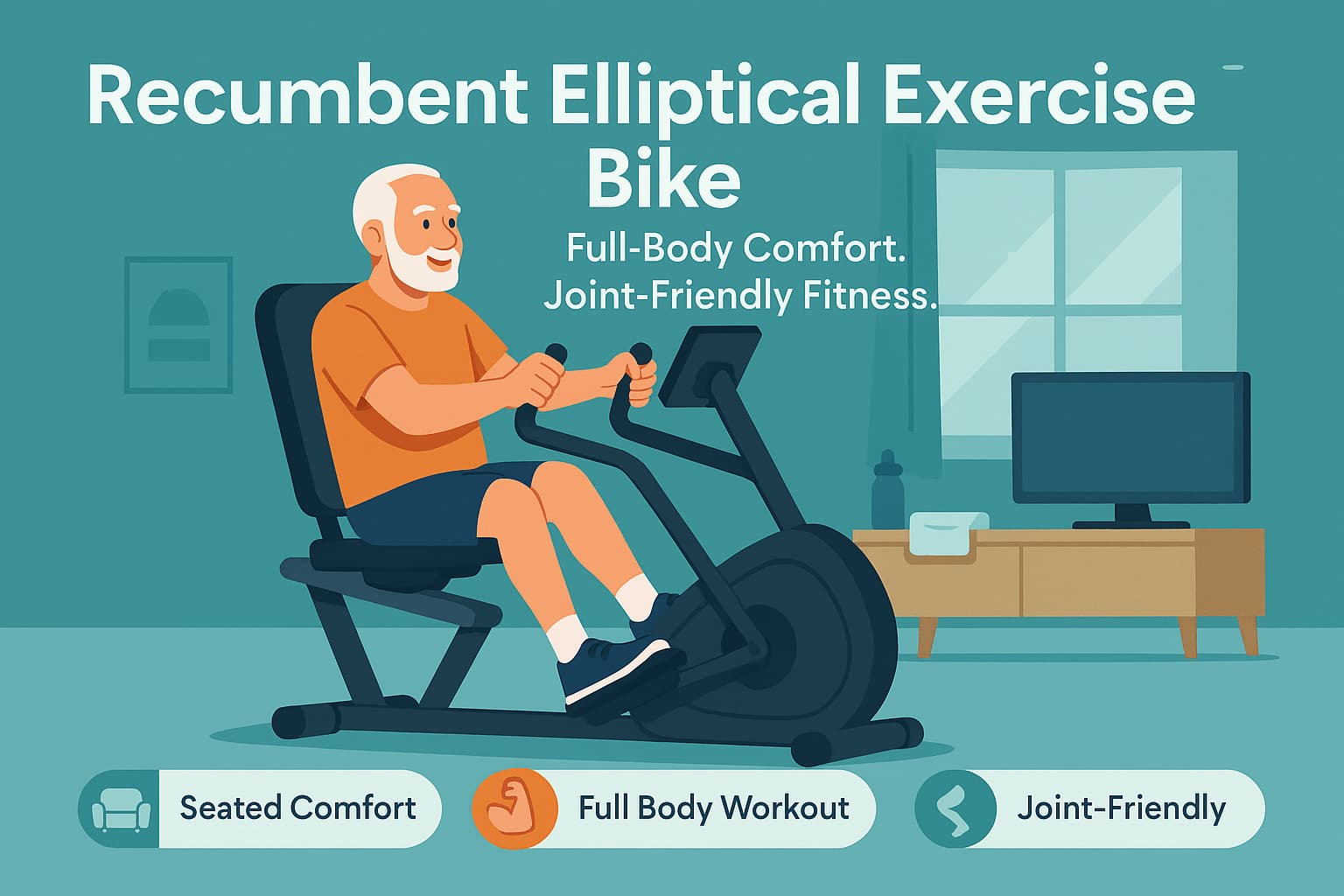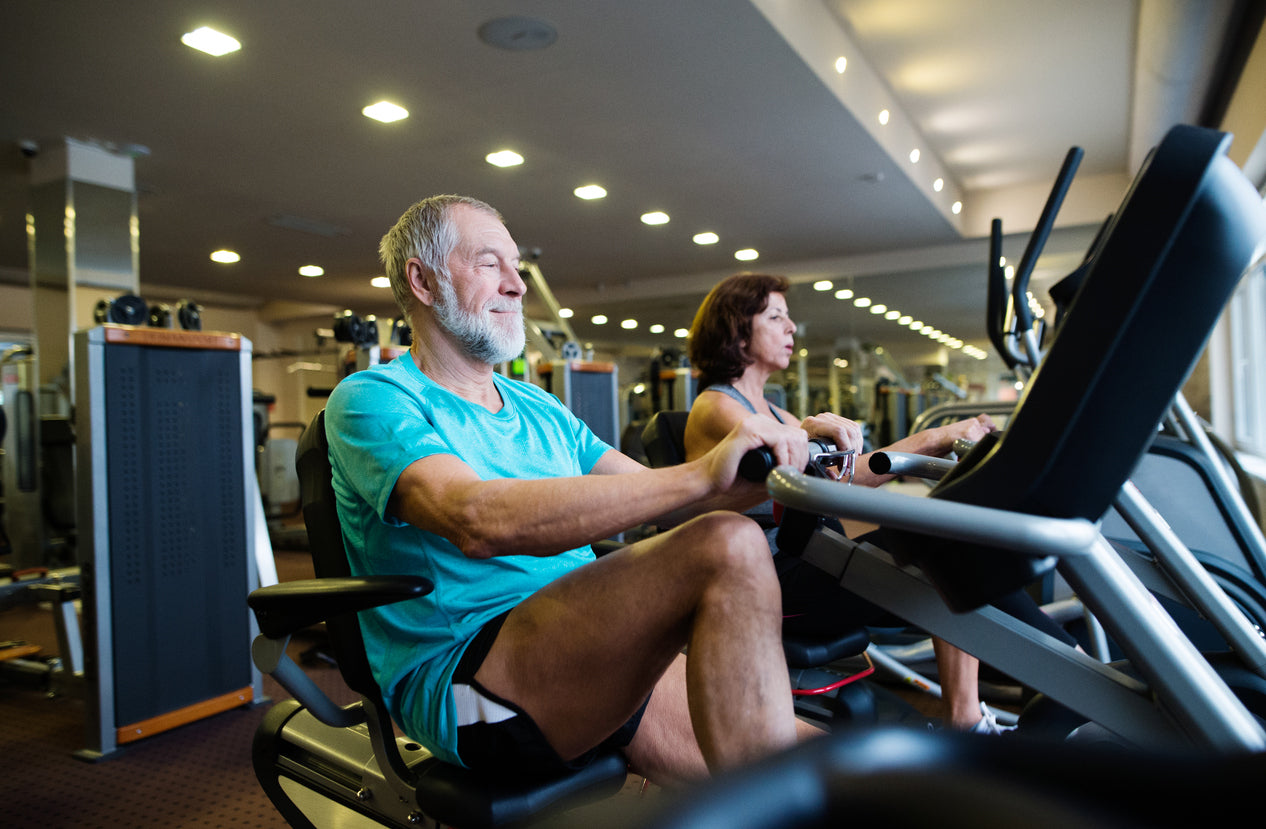Recumbent vs Upright Bike for Weight Loss
When it comes to burning calories and shedding pounds, cycling is one of the most effective and accessible forms of cardio exercise. But not all exercise bikes are created equal. For anyone looking to lose weight, the decision often comes down to two popular options: recumbent bike vs upright bike. These are among the most widely used stationary equipment devices for weight loss. Both machines offer distinct advantages and can help you reach your weight loss goals—but which one is truly better?
In this article, we’ll compare the recumbent bike vs upright bike for weight loss, looking at calorie burn, user comfort, long-term adherence, and suitability for different fitness levels. Whether you’re starting a new fitness journey or looking to upgrade your home gym, this guide will help you make an informed decision.
Things About Exercise Bikes
Exercise bikes have become a staple in home gyms and fitness centers thanks to their effectiveness as cardio equipment and their ability to help users burn calories while working toward their fitness goals. Among the various types of exercise bikes available, recumbent bikes and upright bikes are the most popular choices for those seeking a great cardio workout.
Recumbent bikes are known for their reclined seating position and supportive backrest, offering a comfortable ride that’s easy on the joints. Upright bikes, on the other hand, mimic the feel of a traditional outdoor bicycle, encouraging a more active riding posture and engaging more muscle groups. Both recumbent and upright bikes provide excellent opportunities for cardiovascular fitness and muscle engagement, but each comes with its own set of advantages.
When deciding between a recumbent bike and an upright bike, it’s important to consider factors such as comfort, the type of muscle engagement you prefer, and your personal fitness goals. Whether you’re looking to lose weight, improve endurance, or simply enjoy a low-impact way to stay active, exercise bikes offer a versatile solution for a wide range of users. In this article, we’ll break down the differences between recumbent and upright bikes to help you choose the best option for your needs.
Calorie Burn Comparison
Let’s address one of the most important questions first: Which bike burns more calories?
Generally speaking, upright bikes tend to burn more calories than recumbent bikes during the same time period. This is largely due to the more active riding posture and greater engagement of upper-body stabilizer muscles. Because upright bikes activate both core and upper body muscles, they naturally increase workout intensity and calorie burn compared to recumbent bikes.
According to calorie expenditure data published by Harvard Health [1] and supported by clinical exercise physiology research:
|
Weight (lbs) |
Calories Burned in 30 Minutes (Upright Bike, Moderate) |
Calories Burned in 30 Minutes (Recumbent Bike, Moderate) |
|---|---|---|
|
125 |
210 |
170 |
|
155 |
260 |
210 |
|
185 |
311 |
252 |
Upright exercise bikes provide a full body workout by engaging core muscles and even abdominal muscles, while recumbent bikes focus more on lower body muscles.
These numbers clearly show that the upright bike has a slight edge in terms of calorie burn. Both bikes target the same muscles in the lower body, such as the quad muscles and hamstrings, but upright bikes engage additional muscle groups for a more comprehensive workout.
Upright bikes may burn more calories in a single session, but recumbent bikes offer greater comfort—often leading to longer, more consistent workouts, which are key to sustainable weight loss. What really matters is how consistently you can maintain your routine over weeks and months.
Recumbent bikes do not work just the quad muscles; they also involve other lower body muscles, though with less core muscle activation compared to upright bikes. The upright bike works more muscle groups overall, contributing to higher workout intensity.
Cardiovascular Fitness: Heart Health and Endurance
Improving cardiovascular fitness is one of the primary reasons people turn to exercise bikes, and both recumbent bikes and upright bikes are excellent tools for boosting heart health and building endurance. As the American Heart Association [2] notes, regular sessions on a stationary bike can help strengthen your heart, increase lung capacity, and enhance overall circulation, all of which are essential for long-term wellness.
Recumbent bikes focus on providing a low-impact cardio workout, making them ideal for those who want to protect their joints while still reaping the benefits of aerobic exercise. The reclined position and back support allow users to maintain a steady pace for longer periods, which is great for building endurance without excessive strain.
Upright bikes, in contrast, offer a more intense workout by engaging the core and upper body muscles in addition to the lower body. This upright position not only increases calorie burn but also allows for high intensity interval training (HIIT), which can elevate your heart rate and maximize cardiovascular benefits. HIIT sessions on either recumbent or upright bikes can lead to a higher calorie burn even after your workout is over, thanks to the afterburn effect.
Ultimately, the best choice for cardiovascular fitness depends on your personal preferences and fitness goals. If you value comfort and low-impact exercise, recumbent bikes are a great option. If you’re looking for a more challenging workout that targets the core and upper body, upright bikes may be the better fit. Both types of exercise bikes can help you achieve a healthier heart and improved endurance, making them valuable additions to any fitness routine.
Long-Term Weight Management
While upright bikes may help you burn more calories in a single session, recumbent bikes offer a level of comfort that can lead to longer, more consistent workouts. With a reclined seating position, full back support, and larger seat, recumbent bikes reduce stress on your knees, hips, and lower back. The comfort of the reclined seat, combined with adequate seat coverage and a supportive back rest, enhances stability and user comfort during exercise.
The seat position and pedals positioned in front of the rider on a recumbent bicycle help distribute body weight more evenly, reducing pressure on the lower back and joints. Recumbent pedals and the bike typically feature a sloping backrest, comfortable seat, and ergonomic pedal placement, all of which contribute to a more natural, stable, and comfortable riding experience—especially for those with mobility issues. Recumbent bikes tend to be more accessible and comfortable for longer sessions, making them a preferred choice for many users.
This ergonomic design is particularly beneficial for:
-
Overweight beginners
-
Older adults
-
People recovering from injuries
Because the ride is more comfortable, users are often willing to stay on the bike longer. For example, if a user burns 250 calories in 30 minutes on an upright bike but only lasts 15 minutes, the total output is less than a 45-minute session on a recumbent bike with slightly lower calorie burn per minute.
As supported by Mayo Clinic [3], consistent moderate-intensity cardio yields sustainable fat loss over time. Recumbent bikes encourage users to stay active more consistently, especially in Zone 2 heart rate training (the fat-burning zone).
Matching the Bike to the User
The right bike often depends on the rider’s fitness level and the specific fitness benefits they are seeking, such as cardiovascular endurance, fat burning, or strength development. Here’s a general breakdown of who might benefit more from each option:
Recumbent Bike is ideal for:
-
Beginners who want a low-impact entry point
-
Users with joint or lower back pain
-
Individuals with obesity or limited mobility
-
Seniors looking for gentle cardio
-
Anyone who values an adjustable seat for enhanced comfort and customization
Upright Bike is ideal for:
-
Intermediate to advanced users
-
Those seeking high-intensity interval training (HIIT)
-
People with good balance and posture
-
Riders wanting to simulate road biking
-
Users who prefer upright bicycles or upright stationary bikes, which require you to sit upright like on a road bike and are better suited for those seeking a more intense workout
Matching your personal needs, fitness level, and desired fitness benefits to the right type of bike can significantly improve workout adherence and results.
Here's a side-by-side comparison to help you choose the right bike for your weight loss journey:
|
Feature |
Recumbent Bike |
Upright Bike |
|---|---|---|
|
Seat Comfort |
High (large seat, back support, adjustable seat) |
Low to Moderate |
|
Calorie Burn per Minute |
Moderate |
Higher |
|
Joint Impact |
Low |
Moderate |
|
Muscle Activation |
Primarily lower body |
Lower body + core, greater upper body engagement due to upright riding position similar to a road bike |
|
Ideal For |
Seniors, beginners, rehab users, those needing ergonomic support and a reclined riding position |
Fit users, HIIT fans, road cyclists, those who want the upright bicycle posture and more intense workout |
Stationary upright bikes and upright exercise bikes are designed for users who want to sit upright and closely simulate the riding position and muscle engagement of outdoor cycling on a traditional road bike.
Exercise Plans: From Beginner to Advanced
To help you understand how each bike fits into a weight loss plan, consider these two sample weekly workouts. Both recumbent and upright bikes are popular choices for indoor cycling and losing weight.
Recumbent Exercise Bike (Beginner Plan):
-
Monday: 30 min Zone 2 steady-state (fat-burning)
-
Wednesday: 40 min low-resistance recovery ride
-
Friday: 30 min interval ride (2 min fast, 2 min slow)
-
Sunday: 45 min steady-state ride
The recumbent exercise bike is known for its comfort and accessibility, making it a great option for low-impact cardiovascular workouts and those new to exercise bikes.
Upright Bike (Intermediate Plan):
-
Monday: 30 min HIIT (1 min sprint, 2 min recovery)
-
Tuesday: 45 min moderate steady-state
-
Thursday: 30 min power climb (higher resistance)
-
Saturday: 20 min Tabata-style intervals
Upright bikes are ideal for intense workouts and users seeking a challenging exercise bike routine, helping to maximize calorie burn and muscle engagement.
Both of these two bikes can be effective tools for losing weight, depending on user preference and consistency. Indoor cycling on either type of exercise bike supports weight loss goals through regular physical activity.
Real User Experiences: What Works in the Long Run
Many users share positive transformation stories using both types of bikes. For instance:
Anna, 52: “I started using a recumbent bicycle after knee surgery. At first, I could only ride for 10 minutes. But I gradually increased to 45 minutes a day and lost 25 pounds over 6 months. The comfort of recumbent bicycles made me stick to it.”
Jake, 34: “I used the upright bike, which is a type of stationary bike, for HIIT workouts. It’s intense but works! Riding it felt similar to using an outdoor bike, especially in terms of posture and effort. Combined with calorie tracking, I dropped 15 pounds in two months. But I needed rest days because it was hard on my joints.”
These stories highlight an important truth: the best exercise is the one you can stick with. If you love the machine and it fits your life, it’s more likely to help you reach your goals.
Expert Insight: How Weight Loss Really Happens
According to the CDC[4], weight loss occurs when you burn more calories than you consume—a principle known as calorie deficit. There are four stationary equipment devices commonly used for weight loss, including recumbent and upright bikes, each offering unique benefits. Both recumbent and upright bikes can help you do that.
However, consistency, duration, and recovery all play a role. Here are some tips to maximize fat loss on either bike:
-
Track your workouts and calories burned
-
Ride at least 3–5 times a week
-
Mix steady-state and interval training
-
Combine cardio with strength training
-
Stay in a slight caloric deficit (300–500 kcal/day)
-
Remember, recumbent bike work can be just as effective as upright bike workouts for burning calories and achieving weight loss, as long as you are consistent.
Also, monitor your heart rate zones to optimize fat burn:
|
Heart Rate Zone |
% of Max HR |
Intensity |
Fat Burning Potential |
|---|---|---|---|
|
Zone 2 |
60-70% |
Light |
High |
|
Zone 3 |
70-80% |
Moderate |
Moderate |
|
Zone 4+ |
80%+ |
Vigorous/HIIT |
Lower (more glycogen) |
Conclusion: Which Bike Wins for Weight Loss?
So, recumbent bike vs upright bike for weight loss — who wins?
The upright bike delivers more calorie burn per minute, more intense cardio, and more total body engagement. It's excellent for HIIT and intermediate-to-advanced users.
The recumbent bike offers greater comfort, lower joint stress, and a user-friendly experience that promotes long-term consistency—critical for sustained fat loss.
Verdict:
-
Choose an upright bike if you're fit, pain-free, and motivated by high-intensity workouts.
-
Choose a recumbent bike if you're a beginner, recovering, or need a comfortable, low-impact option.
In the end, the best bike is the one you can ride regularly. Consistency, not intensity, is the real secret to weight loss.
Reference
- Harvard Health Publishing. (n.d.). Calories burned in 30 minutes for people of three different weights. Harvard Health. Retrieved June 27, 2025, from https://www.health.harvard.edu/diet-and-weight-loss/calories-burned-in-30-minutes-for-people-of-three-different-weights
- American Heart Association. (n.d.). American Heart Association recommendations for physical activity in adults. https://www.heart.org/en/healthy-living/fitness/fitness-basics/aha-recs-for-physical-activity-in-adults
- Mayo Clinic Staff. (n.d.). Weight loss: Choosing a diet that's right for you. Retrieved June 27, 2025, from https://www.mayoclinic.org/healthy-lifestyle/weight-loss/in-depth/weight-loss/art-20048466
- Centers for Disease Control and Prevention. (2023, August 29). Steps for Losing Weight. https://www.cdc.gov/healthy-weight-growth/losing-weight/index.html
Latest Articles








